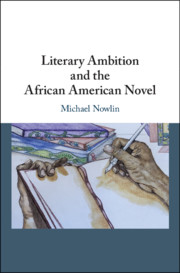Book contents
- Literary Ambition and the African American Novel
- Literary Ambition and the African American Novel
- Copyright page
- Dedication
- Contents
- Acknowledgments
- Abbreviations
- Introduction
- Chapter 1 “The First Negro Novelist”: Charles Chesnutt’s Point of View and the Emergence of African American Literature
- Chapter 2 James Weldon Johnson’s Dream of Literary Greatness and His Groundwork for an African American Literary Renaissance
- Chapter 3 The Strange Literary Career of Jean Toomer
- Chapter 4 Wallace Thurman’s Judgment and the Rush toward Modernism
- Chapter 5 Zora Neale Hurston and the Great Unwritten
- Chapter 6 Richard Wright’s Compromises: Radicalism and Celebrity as Paths to Literary Freedom
- Chapter 7 “Literary to a Fault”: The Singular Triumph of Ralph Ellison
- Conclusion
- Notes
- References
- Index
Chapter 1 - “The First Negro Novelist”: Charles Chesnutt’s Point of View and the Emergence of African American Literature
Published online by Cambridge University Press: 17 October 2019
- Literary Ambition and the African American Novel
- Literary Ambition and the African American Novel
- Copyright page
- Dedication
- Contents
- Acknowledgments
- Abbreviations
- Introduction
- Chapter 1 “The First Negro Novelist”: Charles Chesnutt’s Point of View and the Emergence of African American Literature
- Chapter 2 James Weldon Johnson’s Dream of Literary Greatness and His Groundwork for an African American Literary Renaissance
- Chapter 3 The Strange Literary Career of Jean Toomer
- Chapter 4 Wallace Thurman’s Judgment and the Rush toward Modernism
- Chapter 5 Zora Neale Hurston and the Great Unwritten
- Chapter 6 Richard Wright’s Compromises: Radicalism and Celebrity as Paths to Literary Freedom
- Chapter 7 “Literary to a Fault”: The Singular Triumph of Ralph Ellison
- Conclusion
- Notes
- References
- Index
Summary
This chapter surveys the career of Charles Chesnutt, first by focusing on his strategic, self-conscious efforts to enter what he called the literary world. It looks at Chesnutt’s rise in the literary world through publication with Houghton Mifflin and the critical acclaim of William Dean Howells, then his downfall after The Marrow of Tradition led to his being marked as a propagandist. It analyzes his short story “Baxter’s Procrustes” for its satirical insight into the paradoxes of contemporary literary value. It charts his final years when he was recognized by Harlem Renaissance writers as “the first Negro novelist,” even as he struggled to publish new work during that period, making him a sacrifical precursor for the Harlem Renaissance writers with whom he could only partially identify.
- Type
- Chapter
- Information
- Literary Ambition and the African American Novel , pp. 25 - 48Publisher: Cambridge University PressPrint publication year: 2019

